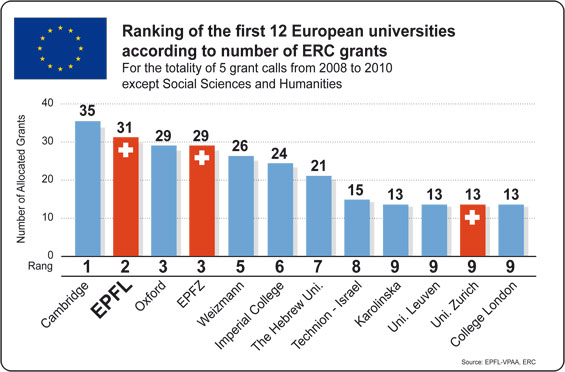Excellence doesn't depend on age!

At 28 and 36 years old respectively, Victor Panaretos et Nicolas Monod are among the youngest scientists to benefit from a European Research Council grant. Thanks to the dynamism of its researchers, EPFL is now in 2nd place in the European league.
Seven billion Euros will be invested between now and 2013 in scientific projects of excellence. ERC grants are used to finance research projects in countries in the European Union and associated countries. The objective of these grants is to encourage young scientists to perform independent and innovative research (ERC Starting Grants), and also to support established scientists in starting more ambitious, interdisciplinary projects (ERC Advanced Grants). Each year, several thousand projects are candidates for subvention. Between 10% and 15% are selected, and financed over five years. There is a free choice of research – no political or economic considerations are taken into account by the committees evaluating the applications.
Since 2007, when the first grants were awarded, a comparative study of the allocation of 1205 grants has shown that 31 scientists from EPFL have benefited from an ERC bourse. This is a remarkable result, which ranks the school in 2nd place behind Cambridge, and in front of Oxford and ETH Zurich.

The ERC regularly announces calls for submissions, directed at all European institutions, so that their scientists can submit their projects. Five announcements have already been made: after the 6th, EPFL will have a total of more than forty recipients of ERC grants.
The winners of the 2010 round have reached a financing total close to 28 million euros.
Taking into account the transfers of grants of young teachers newly appointed at EPFL, this year eleven young EPFL scientists will receive Starting Grants:
Victor Panaretos: Tenure Track Assistant Professor, holder of the Chair of Mathematical Statistics, School of Basic Sciences (SB). His research develops mathematical statistics for random geometrical structures, with applications to biophysics.
Fabrizio Carbone: Grant-recipient Professor, ISIC - Institute of Chemical Sciences and Engineering, School of Basic Sciences (SB). He is working on the spectroscopic diffraction of quantum solids.
Xile Hu: Tenure Track Assistant Professor, Laboratory of Inorganic Synthesis and Catalysis, School of Basic Sciences (SB). The ERC grant is financing his research into molecular catalysis for energy and sustainability.
Dejan Kostic: Tenure Track Assistant Professor, Networked Systems Laboratory, School of Computer and Communications Sciences (IC). He is working on the optimisation of performance and reliability of distributed systems.
Felix Naef: Tenure Track Assistant Professor, Institute of Bioengineering, School of Life Sciences (SV). His research project is studying molecular clocks, using the approach of quantitative biology.
Mark Pauly: Associate Professor, Computer Graphics and Geometry Laboratory, School of Computer and Communications Sciences (IC). He is studying calculation methods for the analysis of 3D forms, the recording of human movement, and computer-assisted design.
Aleksandra Radenovic: Tenure Track Assistant Professor, Laboratory of Nanoscale Biology, School of Engineering (STI). Her group is working on nano-fabricated structures as part of the study of biomolecular systems.
Henrik Ronnow: Tenure Track Assistant Professor, Laboratory for Quantum Magnetism, School of Basic Sciences (SB). He is studying collective quantum phenomena in magnetic materials under extreme conditions.
Nicolai Cramer: Tenure Track Assistant Professor, Laboratory of Asymmetric Catalysis and Synthesis, School of Basic Sciences (SB). Design and Exploitation of C-C and C-H Activation Pathways in Asymmetric Catalysis
Stephanie Lacour: Tenure Track Assistant Professor, Institute of Microtechnology, School of Engineering (STI). She is developing electronic devices on supple substrates, at the interface with the nervous system, to create stretchable “electronic skins” and neuroprosthetics.
Michael Gastpar: Professor, Information and Communication Systems Laboratory, School of Computer and Communication Sciences (IC). His research explores the relationships between communication and computation.
Six ERC Advanced Grants have been awarded to:
Nicolas Monod: Professor, holder of the Chair of Ergodic and Geometric Group Theory, School of Basic Sciences (SB). His project is called Rigidity. It concerns the discovery of unexpected structures and symmetries, such as a crystal in its gangue.
Wulfram Gerstner: Professor, Computational Neuroscience Laboratory, School of Computer and Communication Sciences (IC), School of Life Sciences (SV). Synaptic multi-factor learning rules: from action potentials to behaviour.
Martin Odersky: Professor, Programming Methods Laboratory, School of Computer and Communication Sciences (IC). His field is functional and object oriented computer languages. For example SCALA, the language used by Twitter and LinkedIn.
Nava Setter: Professor, Laboratory of Ceramics, School of Engineering (SIT). Her project is called Mobile Walls. It concerns the study, monitoring and utilization of mobile interfaces in ferroelectric materials.
Didier Trono: Dean of the School of Life Sciences (SV). His project will analyze the “epigenetic” mechanisms of gene regulation.
Michaël Unser: Professor, Biomedical Imaging Group, School of Engineering (SIT). His research focuses on the development of new algorithms and mathematical tools for the advanced processing of medical and biological images.